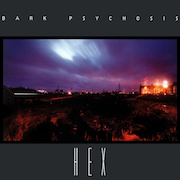Listening is intentional – it is an action in response to a sound. Hearing is a passive response to a sound – an elevator music situation. On their 1994 debut, Hex, Bark Psychosis are listening to each other, thinking about each other’s responses to music. You can pick this up in the use of stereo in the recording of Hex, with a web of statements and replies between the channels between different percussion patterns and bass. And John Ling’s bass itself in these recordings plays a humble, accenting but key role in the record’s overall mood – the only time it really becomes a feature is on ‘Big Shot’, where it is ominous and propulsive. There is a vibraphone on ‘Absent Friend’, and it just sounds right, rather than gaudy.
You also have a band who do not seem concerned with whether they sound like any of their predecessors. They were inspired rather than influenced by Can and Miles Davis; Disco Inferno, Explosions In The Sky, Talk Talk’s Laughing Stock or Godspeed You Black Emperor’s f sharp a sharp infinity are almost their peers. The pacing of Hex is surely influenced by the natural acoustics of St John’s Church in Stratford, where it was recorded. Making an album in an unusual building can seem like a gimmick if the musicians aren’t paying attention to their surroundings. With Hex there’s a genuine sense of exploration, of inhabiting the space as they compose in it.
The effects of the church’s reverb were apparent on the original release, but the subtleties are far clearer on this remaster. Hex has a very loose, sprawling kind of songwriting – it’s a guitar album that creates and maintains atmosphere. The slow dusty guitar tremelo on ‘Absent Friend’ may well be a homage to Talk Talk’s ‘Myrrhman’, though it’s an unusually vocals-driven track for Hex. Though the album is modern in its approach to production, there’s very little in the way of sampling, except on ‘Big Shot’ where there is the sound of a car door being opened and the ticking of an indicator. Easy to miss, these samples blend in well with the track’s gentle percussion. On ‘Finger Spit’, the guitar line plays off the gentle unease of Graham Sutton’s vocals, the phrase “any way out” rounded off with a growling pitch bend. All these details, they’re right there on the original release of this great record but just a little closer and clearer on the remastered rerelease.


